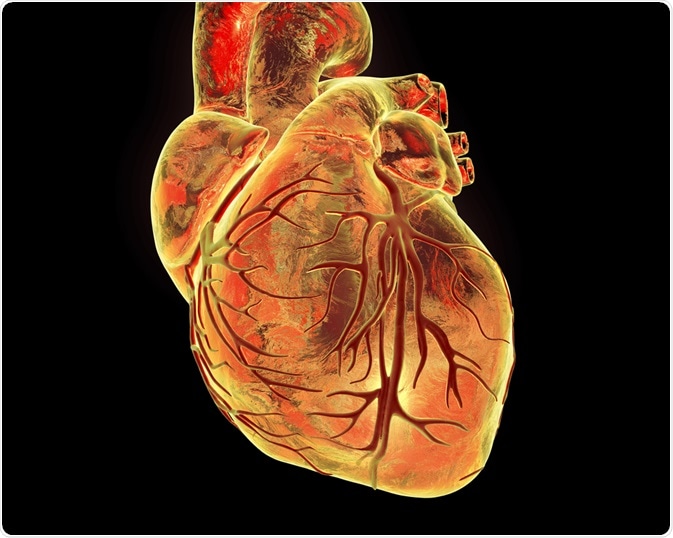The term myocarditis describes inflammatory disorders of the heart muscle caused by different infectious and non-infectious factors. The pathogenesis of this condition is complex and includes direct viral myocardial damage, as well as autoimmune reactions against specific cardiac epitopes. Clinical presentation of myocarditis is highly variable and ranges from asymptomatic disease to fulminant heart failure and sudden cardiac death.

Image Credit: Kateryna Kon / Shutterstock.com
A majority of patients with acute myocarditis do not require therapy. Individuals with left ventricular dysfunction or symptomatic heart failure should adhere to current heart failure therapy guidelines. As the selection of potential treatment requires invasive diagnostic approaches, complex immunological and microbiological analysis, as well as a detailed clinical evaluation, all patients with myocarditis should get a multidisciplinary workup.
Supportive care and heart failure therapy
Supportive care is the first line of treatment for myocarditis; therefore, every patient with active myocarditis should avoid physical activity for at least six months – even in cases of early recovery. Individuals with myocarditis can develop dangerous and potentially fatal arrhythmias, which often resolve spontaneously after the acute phase; hence, continuous ECG monitoring of hospitalized patients is warranted.
Treatment options for acute myocarditis generally follow the heart-failure regimen for systolic heart failure, as described in the current guidelines of the European Society of Cardiology. Mainstays of medical therapy including angiotensin-converting enzyme (ACE) inhibitors or angiotensin receptor blockers, beta-blockers such as carvedilol and metoprolol, aldosterone antagonists, and diuretics.
In patients whose condition gets worse despite optimal medical management, mechanical circulatory support can be instituted in the form of ventricular assist devices or extracorporeal membrane oxygenation, for example. Temporary pacemaker insertion can be considered for affected individuals with symptomatic atrioventricular (AV) block II or III. Survival after heart transplantation for myocarditis is comparable to other causes of cardiac failure.
Specific treatments
To halt myocarditis progression and its possible evolution to dilated cardiomyopathy, the underlying pathogenic mechanisms, such as viral infection or persistent autoimmune-mediated damage, should be addressed. Detailed diagnosis of the pathogen and sufficient knowledge of the pathophysiology that can lead to heart failure are challenges of treating such primary mechanisms.
It has been demonstrated that immunoglobulins have both antiviral and anti-inflammatory effects, thus they may suppress proinflammatory cytokines and reduce oxidative stress. Intravenous immunoglobulin (IVIG) might have a role in the treatment of myocarditis, especially considering acute pediatric myocarditis.
Immunosuppression is a well-established treatment in giant cell myocarditis since it has been shown that patients with this condition had a significantly prolonged transplant-free survival when treated with prednisone and cyclosporine. This type of treatment regimen is also employed in hypersensitivity myocarditis, as well as in myocarditis associated with systemic diseases like sarcoidosis and lupus erythematosus.
Antiviral therapy is currently not recommended for the treatment of acute myocarditis; however, the role of antiviral therapy for chronic types of myocarditis associated with persistent viral genomes is a matter of active research endeavors. The treatment scheme in chronic viral cardiomyopathy is based on the experiences gained in multiple sclerosis.
Both interferon-α and interferon-β have been shown to result in hemodynamic and clinical improvement in dilated cardiomyopathy and myocarditis, although we lack large-scale, multicenter clinical trials. Studies on animals have demonstrated that monoclonal antibodies with high purity and strong specificity represent a promising approach in the treatment of viral myocarditis.
References
Further Reading
Last Updated: Apr 12, 2021